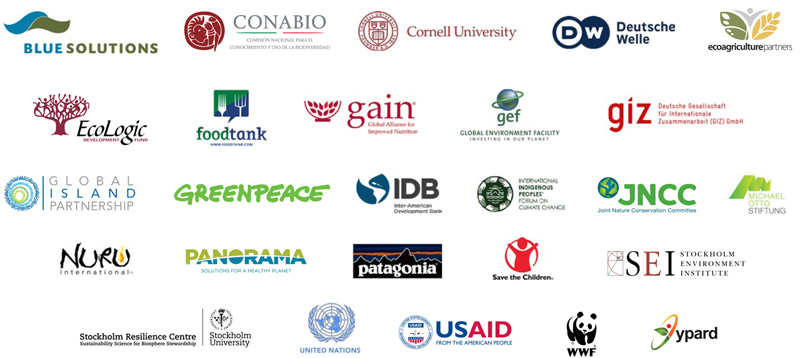Farming for Biodiversity Matters
The Issue
Growing the food to feed our planet takes more than 570 million farms worldwide, most of which are small—operating on less than two hectares—and family-run. In developing countries, small-scale agriculture is a mainstay of employment and subsistence for men and women, and it supplies most of the food consumed in urban areas.
Biodiversity is essential for agriculture and serves as its base. However, unsustainable agricultural practices remain one of the greatest threats to healthy ecosystems and biodiversity. With the world population expected to reach nine billion by 2050 and as climate change further threatens livelihoods, we need to identify more sustainable agricultural practices that support both farmers and the environment upon which we all depend.
Agriculture drives 80% of deforestation
Land use contributes to 20-25% of climate change
Smallholder farmers provide more than 80% of food consumed in developing countries
Our Solution
The good news is many solutions already exist at the community level. At the global level, the Convention on Biodiversity’s Aichi targets creates a path towards biodiversity protection and sustainable use by 2020. Consumers are also becoming increasingly aware of how their choices affect the environment and the people who depend on it.
Farming for Biodiversity—the 2017 Solution Search theme—surfaces what works for farmers at the community level and takes these bright spots to scale. It is designed to identify, celebrate and help replicate community-driven solutions from around the world that align biodiversity preservation with agricultural production. Our vision is to make these community-led initiatives shine and reach thousands of people worldwide. This is how we do it.

In 2017, we joined PANORAMA – Solutions for a Healthy Planet to showcase some of the best ways to connect agriculture with biodiversity. Through our global crowdsourcing effort, we have surfaced a total of 338 solutions—inspired by communities around the world—that show us how to do this.
Explore the 10 brightest ideas, selected by our jury:
A Growing Culture is partnering with a farming community in Hanoi to create healthy hog bedding called “Living Bio-Beds”…
Building on the country’s strong honey sector, Apis Agribusiness established wild honey production to help employ rural youth…
Canopy Bridge is capitalizing on the burgeoning Latin American food movement to help indigenous communities from the Amazon by connecting Ecuador’s best chefs with indigenous communities…
Desarrollo Alternativo e Investigación A.C. led a seed dissemination process to diversify crops grown in Chiapas State…
German NGO Fairventures Worldwide is working to combat deforestation’s environmental and economic impacts by helping farmers institute a better land-use system focused on improving soil quality…
ECOTOP is using the idea of natural succession dynamics—growing a combination of various crops and trees at different levels…
Manor House offers training programs in sustainable agriculture, such as organic farming, to help poor, small-scale farmers in Kenya produce higher yields…
In response to the degradation of puna habitat and declining livestock production, The Mountain Institute is connecting regional farmers with external experts to improve irrigation…
Pollution in the Banganga River Basin was contributing to biodiversity loss, land degradation and other environmental challenges…
A pilot project that is bringing together farmers, NGOs and government agencies is reviving interest in nutritious African Leafy Vegetables…
Winning Solutions
A global jury of more than 30 agriculture and biodiversity experts from across disciplines selected winning solutions in six categories. These are our local champions who were celebrated for their successes at the annual climate change conference in Bonn (COP23).
Working with 14,000 indigenous households to switch to climate-resilient land management.
Fighting youth unemployment and deforestation with organic honey production.
Introducing successional agroforestry to fight malnutrition and forest degradation.
Creating an economically viable alternative to palm oil monoculture in Borneo.
Saving local maize and bean species while increasing yields by 10%.
Reviving ancient Pre-Incan water systems to save the Puna grasslands and strengthen water security.
Where We Work
Our scaling campaigns, based on behavioral insights and the latest knowledge in sustainable agriculture, occur in nine countries: Benin, Bolivia, Ecuador, Ethiopia, Kenya, Mexico, Nepal, Peru, and Vietnam.
By the Numbers
based on media coverage (BBC, Thomson Reuters, Deutsche Welle, NPR, and others)
in behavioral insights, technical knowledge, and organic agriculture trends
by local leaders in 9 countries running 36 campaigns that promote proven agriculture solutions
Rare report on 300 community-based farming solutions provides pathway to protecting biodiversity globally
In 2017, Rare’s Solution Search competition unearthed 338 community-based solutions to help farmers and other agricultural practitioners adopt ecologically-friendly practices that protect biodiversity. This report responds to the accelerating loss of biodiversity globally with proven and promising solutions, while also identifying the common success factors that allow for replication, and a blueprint for scaling the adoption of sustainable behaviors needed to protect biodiversity globally.
Our Partners
Solution Search: Farming for Biodiversity is driven by a global alliance of organizations aiming for more sustainable land use and agriculture.
Rare teamed up with IFOAM – Organics International as Implementing Partners to combine our expertise in behavior design and social marketing with IFOAM’s role as a global leader in in organic farming.

Solution Search: Farming for Biodiversity contest partners included the following: Blue Solutions, the Convention on Biological Diversity, EcoAgriculture Partners, Global Island Partnership, IFOAM – Organics International, Panorama, Patagonia, Save the Children, and Young Professionals for Agricultural Development (YPARD). The initiative is supported by the German Federal Ministry for the Environment, Nature Conservation, and Nuclear Safety.
